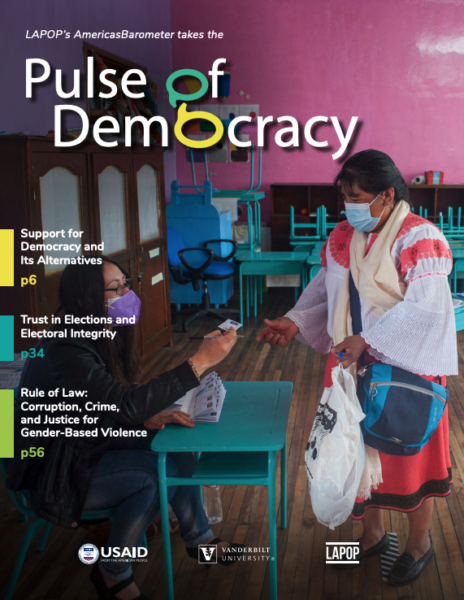
Democracy is still struggling in the Americas, with citizens reporting high skepticism about electoral democracy, according to the newly released 2021 Pulse of Democracy report from Vanderbilt University’s LAPOP Lab.
“Support for democracy is low but holding steady. Citizens want politics to reflect their views, fair elections and politicians who act with integrity,” said Elizabeth Zechmeister, Cornelius Vanderbilt Professor of Political Science and director of LAPOP, and Noam Lupu, LAPOP associate director, in the report’s introduction. “Improving the health of democracy will require concerted efforts around dialogue, inclusion, equity and good governance.”
In 2010, researchers found that 68 percent on average of the 34,953 people interviewed in 22 countries expressed strong support for democracy as the best form of government. That rate dropped 10 percentage points between the 2010 and the 2018/19 round of the AmericasBarometer.
In 2021, researchers discovered that support for democracy recovered slightly to 61 percent of 60,661 people interviewed across the same 22 countries in the region. And, although support for democracy remains lower than the 68 percent of about a decade ago, the new data also reveals hopefulness: Despite the pressures that the COVID-19 pandemic on governments across the region, belief in democracy as a preferred system of remained steady.
Though more government assistance was needed during the pandemic, many citizens surveyed reported they prefer freedom of speech over guaranteed access to basic income and services. And a desire for clean governance remains notable, with three in five citizens in the average Latin America and Caribbean country believing that corruption is widespread—a number that has remained stable since 2016.
The AmericasBarometer has been conducted every two years since 2004 by LAPOP, a survey research lab at Vanderbilt University. Twenty-two nations across North and South America, including the Caribbean, were surveyed in this round. Topline results were presented and livestreamed on Tuesday, Nov. 16, at the Wilson Center in Washington, D.C.
The new report, available in its entirety here, outlines varied outcomes about attitudes toward democracy among the 64,362 people interviewed in the 2021 round of the survey project. Notable findings across different themes include:
Support for Democracy and its Alternatives
- Support for democracy has not recovered to levels recorded a decade ago.
- While citizens are less likely to tolerate a military takeover than they were a decade ago, they are considerably more likely to tolerate an executive who rules without the legislature in times of crisis.
- Satisfaction with democracy rose slightly but remains lower than a decade ago.
- The public in Latin America and the Caribbean is often willing to sacrifice elections for a system that guarantees income and basic services, but less willing to sacrifice freedom of expression.
- Large majorities across the region prefer direct democracy over electing representatives.
- Individuals who express a preference for elections, freedom of expression, and elected representatives are more likely to support democracy in the abstract.
Trust in Elections and Electoral Integrity in Latin America and the Caribbean
- Trust in elections recovered across the region from 38 percent in 2018/19 to 42 percent in 2021, but most people continue to express low confidence in electoral processes.
- There is wide variation across countries in terms of beliefs about election integrity: 69 percent of Uruguayans believe that votes are always counted correctly, but only 18 percent in Colombia, Guyana and Jamaica agree.
- Across the region, half of the public believes foreign governments sometimes influence elections.
- Beliefs about election integrity correlate with overall trust in elections and support for democracy.
The Rule of Law: Corruption, Crime and Justice for Gender-Based Violence
- More than three in five people in the average LAC country believe that most or all politicians are corrupt.
- Corruption victimization by public officials has increased in 2021 compared to the 2018/19 round.
- Crime victimization decreased in 2021 compared to 2018/19.
- Neighborhood insecurity decreased in 2021 compared to 2018/19.
- Perceptions of fair treatment and due process for gender-based violence (GBV) victims are gendered: women are less likely to agree that GBV perpetrators will be punished. That difference in perceptions persists when accounting for age, education and wealth.
- Deficiencies in the rule of law shape trust and support for democracy: those who perceive and experience a failure of institutions are less trusting of those in their community and the national government and are less supportive of democracy.
Intentions to Emigrate
- Intentions to emigrate from countries such as Mexico, El Salvador, Guatemala, Haiti and Honduras increased in 2021.
- Food insecurity also increased significantly in 2021 and is a key predictor of migration intentions.
ABOUT LAPOP
The LAPOP Lab at Vanderbilt University is a center for excellence in international survey research and a leader in public opinion polling in the Americas, with more than 40 years of experience. The AmericasBarometer is the most comprehensive scientifically rigorous comparative public opinion survey in the western hemisphere. The surveys are based on national sample designs and conducted with the assistance of partners across the region. Core support for LAPOP’s work is provided by USAID and Vanderbilt University.